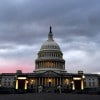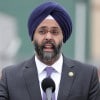Analysis | The Technology 202: These scientists are trying to help Congress get smarter about tech – The Washington Post

The United States Capitol building. (Photo by Jonathan Newton/The Washington Post)
Ctrl + N
Congress doesn’t have a tech-savvy reputation: Lawmakers’ cringeworthy questions during the 2018 hearings with Facebook chief executive Mark Zuckerberg are now legend in Silicon Valley.
But a team of government scientists and technologists is trying to help lawmakers get smarter about tech issues — as they come increasingly in the spotlight on Capitol Hill.
The Government Accountability Office’s Science and Technology Assessment and Analytics group, created last year, is ramping up its work: It wants to double its current ranks of about 70 people providing technical assessments to Congress on topics such as artificial intelligence in health care or 5G wireless.
“At such a time as this, you can’t avoid” tech issues, Tim Persons, GAO’s top scientist tasked with leading the group, told me at a recent event hosted at the National Academy of Sciences. “There’s so much disruption going on and so much potential for good in solving our complex adaptive systems problems of the day. And it’s our job to sort of help bridge that gap of understanding.”
“The policymakers are not unwise to the issues,” he added. “They’re very keen on that. … It’s just my job to say ‘here’s what this means and here’s what this is,’ in order to de-risk or help frame the issues so they can do their jobs.”
But lawmakers and experts don’t think the GAO’s initiative is enough to bridge the chasm between Congress’s understanding and the complex tech challenges of our time — especially as election interference on social media, a national privacy debate and new technologies such as quantum computing and 5G are increasingly top of mind for lawmakers.
Momentum is growing on Capitol Hill to revive the Office of Technology Assessment, a long-defunct agency that was tasked with helping Congress get up to speed with tech issues. The issue has gained a greater political spotlight in recent months as Democratic presidential candidates including Sen. Elizabeth Warren (Mass.) and Andrew Yang have called to bring back the office, which was defunded in 1995.
Reps. Mark Takano (D-Calif.) and Bill Foster (D-Ill.) and Sens. Mazie Hirono (D-Hawaii) and Thom Tillis (R-N.C.) last year introduced legislation that would enhance the OTA in a manner that complements the existing team within the GAO.
Alex Howard, an open-government advocate who previously served as deputy director of the nonprofit Sunlight Foundation, agrees that a new organization is needed.
The GAO’s effort “is a valuable addition and is well on its way to doing tremendous work informing Congress, but the long-range vision that a rebooted and reformed OTA would provide is not an optimal cultural fit for the GAO,” he told me. “Every report on this issue has identified a gap that the GAO is not addressing and has recommended a new entity to bridge it.”
“That doesn’t mean just refunding the OTA as it was in the 20th century, but rebooting it as it should be in this young millennium, with significant changes and updates,” he added. “The bill from Takano and Tillis is a starting point for the debate about how to improve the capacity of Congress to legislate and oversee technology at a time when doing so has never been more important.”
But others think it’s unlikely that an OTA or similar agency would be able to coexist productively with the current initiatives.
“I’d like to see a new authorizing bill to give STAA more autonomy and independence,” said Zach Graves, head of policy at the Lincoln Network, an advocacy group for conservatives and libertarians in the tech sector.
Persons says the push to bring back the OTA reflects the magnitude of the problem — and that one government institution won’t be able to solve Congress’s tech challenges alone. “I don’t think that one government institution… is in and of itself is going to solve it,” he said. “We’re going to have to do this in a broad ecosystem.”
“There’s just so much to do,” he said. “Whatever Congress decides it needs to do to fulfill its needs, we’re going to support that.”
Persons says there’s growing demand among lawmakers to get ahead on issues coming down the pike in tech so that they’re not constantly playing catch-up. “There is an appetite, you might be surprised, for foresight in the Congress,” Persons said. “They want to know what are the big things coming because they want to be more proactive rather than reactive.”
BITS, NIBBLES AND BYTES

Emily Cunningham, center, who works as a user experience designer at Amazon, speaks during a news conference following Amazon’s annual shareholders meeting. (Ted S. Warren/AP)
BITS: More than 330 Amazon employees published comments criticizing the tech giant’s environmental policies in defiance of their employer’s communications policy yesterday, my colleague Jay Greene reported. They launched the action in support of colleagues who were warned they could be fired for publicly criticizing the company’s climate practices, marking an escalation in tech workers’ activism.
“Hundreds of us are now putting our job on the line — because we all believe that speaking up about the climate crisis is necessary and the right thing to do at this time,” Sarah Tracy, a software development engineer, wrote in an email to Jay. “A policy that prevents employees from speaking out in this way at this time just won’t work for us.”
Amazon threatened to fire two workers, Maren Costa and Jamie Kowalski, after they criticized Amazon’s environmental policies to The Post in October. Amazon rules bar workers from commenting publicly on its business without corporate justification and approval from executives. (Amazon founder and chief executive Jeff Bezos owns The Washington Post.)
Amazon workers have also criticized the company for its work with Immigration and Customs Enforcement and the dangers of its facial recognition software technology. And they’re not alone: Workers at Microsoft and Google have launched similar protests. Google workers alleged they were fired in retaliation for their public criticism of the company and their attempts to organize. (Google has denied it was retaliatory.)

U.S. Attorney General William P. Barr. (Michael A. McCoy/AP)
NIBBLES: At least seven state attorneys general will meet next week with U.S. Justice Department officials to share information on their respective investigations into Google, John D. McKinnon, Ryan Tracy and Brent Kendall at the Wall Street Journal report. The meeting could lead to the two groups joining forces and dividing up some of the work related to their broad probes of the search giant.
The meeting probably will focus on competition issues regarding Google’s online advertising, search and Android mobile operating businesses, the Journal reports. State attorneys general and the DOJ formed a similar coalition in the 1990s in an antitrust case against Microsoft.
The size of the coalition, which includes 51 attorneys general, reflects “the importance of these issues to Americans across the country, regardless of location or political persuasion,” U.S. Attorney General William P. Barr said in a speech to National Association of Attorneys General last month. The DOJ has also hired more staff for its legal team to work on the matter, the Journal reports.

The Google logo. (Gabby Jones/Bloomberg News)
BYTES: Google this month started charging law enforcement and other government agencies for legal requests for emails, location-tracking information and other data, Gabriel J.X. Dance and Jennifer Valentino-DeVries at the New York Times report.
Silicon Valley companies have long avoided charging fees for such requests — especially because they could make them appear like a business is trying to make money off controversial legal searches. Google says the new fees will help offset the costs of a surging number of increasingly complicated warrants and subpoena requests. But some officials worry the change will set a costly precedent that could hinder law enforcement efforts.
Law enforcement officials told The Times it was too early to know the impact of the fees.
Privacy advocates say that the fees, which Internet service providers and other telecommunications companies have charged for years, could deter excessive surveillance.
“The actual costs of doing wiretaps and responding to search warrants is high, and when you pass those costs on to the government, it deters from excessive surveillance,” said Al Gidari, consulting privacy director at Stanford’s Center for Internet and Society.
PUBLIC CLOUD
— News from the public sector:
Pentagon Blocks Clampdown on Huawei Sales
The Commerce Department has withdrawn proposed regulations making it harder for U.S. companies to sell to Huawei from their overseas facilities after objections from the Pentagon and the Treasury Department.
The Wall Street Journal
Facebook violates data protection law, German court says
Ruling comes as Italy’s competition authority threatens Facebook with a second €5 million fine.
Politico Europe
New Jersey Bars Police From Using Clearview Facial Recognition App
Reporting about the powerful tool with a database of three billion photos “troubled” the state’s attorney general, who asked for an inquiry into its use.
The New York Times
PRIVATE CLOUD
— News from the private sector:
The new streaming wars: Tech giants are fighting for top gaming stars
The fight for top gaming talent mirrors the big budget battles for stars in the music and film industries.
CNN
YouTube moderators are being forced to sign a statement acknowledging the job can give them PTSD
Documents discovered by The Verge reveal that the company puts the onus of mental health on its employees.
The Verge
While Microsoft Was Making Its Climate Pledge, It Was Sponsoring an Oil Conference
“Microsoft is delighted to announce we are the digital transformation partner of the International Petroleum Technology conference.”
Vice
#TRENDING
— Tech news generating buzz around the Web:
Panic and Criticism Spread on Chinese Social Media Over Coronavirus
Chinese citizens are overcoming a lack of reporting on the crisis in the state-run media by sharing their own videos and information about the coronavirus outbreak.
The New York Times
Progressive influencers, activists, and presidential campaigns are organizing behind digital closed doors.
Vox
The Divine Origins of the Horny Chain Text
Crude, emoji-based chain texts are an internet-indigenous art form, and a viral menace. But where do they come from?
The Atlantic
Can This Notorious Troll Turn People Away From Extremism?
Steven Bonnell, known online as Destiny, has made a business of picking fights with alt-right carnival barkers and other partisan provocateurs.
Wired
CHECK-INS
— Coming Up:
- The Internet Education Foundation will host the 16th annual State of the Net Conference on Tuesday in Washington.
- The House Energy and Commerce communications and technology subcommittee will hold a hearing on “Empowering and Connecting Communities through Digital Equity and Internet Adoption” on Wednesday at 10:30 a.m.
- New America’s Open Technology Institute will host an event titled “Privacy’s Best Friend: How Encryption Protects Consumers, Companies, and Governments Worldwide” on Feb. 4 at 12 p.m.
- Federal Trade Commissioners Noah Joshua Phillips and Rebecca Kelly Slaughter will address current technology policy issues during a panel conversation hosted by the Technology Policy Institute on Feb. 5 at 10 a.m.
- Silicon Flatirons will host its “Technology Optimism and Pessimism” conference Feb. 9 and 10 at the University of Colorado Law School in Boulder. Speakers include Federal Communications Commissioner Michael O’Rielly and Federal Trade Commissioner Rohit Chopra.
- Mobile World Congress takes place Feb. 24 to 27 in Barcelona.
















